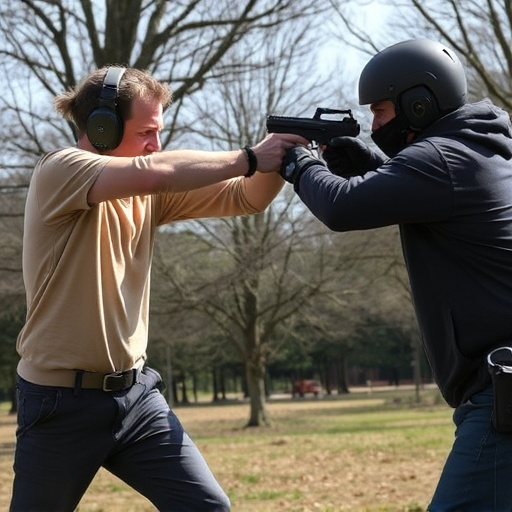Carrying pepper spray for self-defense requires understanding and adhering to local legal considerations, including permit processes, allowed spray types, and training requirements. Choosing reputable brands and adhering to regional restrictions ensures responsible use. With success rates from 70% to 95%, pepper spray offers crucial escape time but must be used in compliance with "stand your ground" laws and local regulations to avoid legal issues.
“Maximizing your personal safety is paramount, and understanding the power of pepper spray as a self-defense tool can be life-saving. This comprehensive guide navigates the legalities surrounding maximum strength pepper spray, equipping you with essential knowledge on how to legally carry such a device. From understanding the legal framework to choosing the right spray and learning effective usage techniques, this article ensures you’re prepared. Discover the strategies for self-defense, considering both its effectiveness and the potential legal implications.”
- Understanding Pepper Spray Defense Legally: What You Need to Know
- Choosing and Carrying Your Maximum Strength Pepper Spray Safely
- Using Pepper Spray for Self-Defense: Effectiveness and Legal Implications
Understanding Pepper Spray Defense Legally: What You Need to Know
Carrying pepper spray for self-defense is a significant legal consideration that varies by jurisdiction. Understanding how and when it’s permissible to use and carry this defensive tool is crucial before employing it as a last resort. Each region has specific laws dictating the types of pepper spray allowed, minimum concentrations, and licensing or registration requirements for ownership.
To legally carry pepper spray, you must familiarize yourself with local regulations. This involves checking state and local laws to ensure compliance with permit or registration processes. Some areas might restrict its use to law enforcement or require specific training and certifications for civilian possession. Knowing the legal framework surrounding pepper spray defense enables responsible individuals to protect themselves while adhering to established guidelines.
Choosing and Carrying Your Maximum Strength Pepper Spray Safely
Choosing and carrying your maximum strength pepper spray safely is paramount for self-defense. Opt for reputable brands that offer high-quality, reliable products, ensuring a consistent and potent formula. Check local laws and regulations regarding pepper spray ownership and usage; different regions have distinct restrictions on the type, quantity, and where it can be carried. Legally, you must obtain a permit or license in many areas to carry pepper spray for self-defense purposes.
When carrying your spray, store it in an easily accessible yet secure location. Keep it out of reach of children and pets. Always keep the safety mechanism intact until you’re ready to use it. Familiarize yourself with the spray’s trigger and usage instructions; quick deployment is crucial in a dangerous situation. Regularly review local laws and update your pepper spray knowledge to ensure compliance and maximize its effectiveness as a legal self-defense tool.
Using Pepper Spray for Self-Defense: Effectiveness and Legal Implications
Using pepper spray for self-defense can be an effective way to deter and disable an attacker, providing a crucial tool for personal safety. However, it’s essential to understand its effectiveness and legal implications. Pepper spray temporarily blinds and irritates eyes, making it hard for an assailant to see or breathe. This can give the user precious time to escape or call for help. Studies show that pepper spray is successful in 70-95% of applications, significantly increasing the likelihood of avoiding harm.
Knowing how to legally carry pepper spray is paramount. Different jurisdictions have varying regulations on who can possess and carry it. In many places, you’ll need a permit or license, and there are restrictions on the amount and type of spray allowed. It’s crucial to research and comply with local laws to avoid legal repercussions. Additionally, understanding “stand your ground” laws in your state might provide legal protection when using pepper spray for self-defense.
Understanding the legal aspects of pepper spray defense is crucial for its effective and safe usage. Knowing how to choose, carry, and deploy maximum strength pepper spray responsibly can deter potential threats while adhering to local regulations. Always remember, self-defense should be a last resort, and staying informed about your rights and obligations regarding pepper spray possession is essential when considering How to Legally Carry Pepper Spray.
